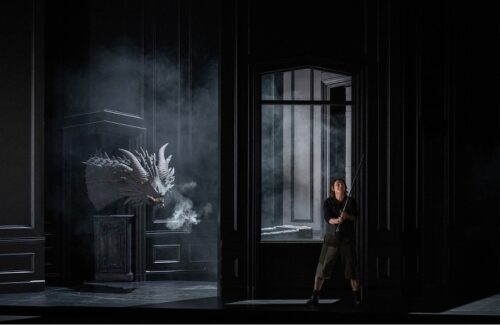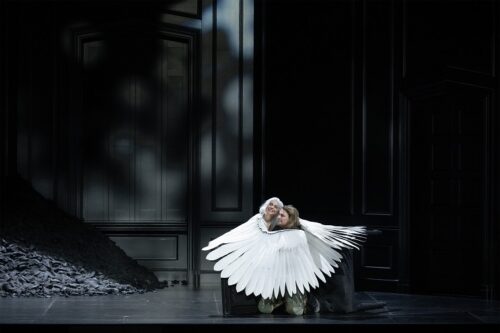 Switzerland Wagner, Siegfried: Soloists, Philharmonia Zurich / Gianandrea Noseda (conductor). Zurich Opera, 5.3.2023. (MF)
Switzerland Wagner, Siegfried: Soloists, Philharmonia Zurich / Gianandrea Noseda (conductor). Zurich Opera, 5.3.2023. (MF)

Production:
Director – Andreas Homoki
Set and Costumes – Christian Schmidt
Lighting – Franck Evid
Artistic cooperation set – Florian Schaaf
Video – Tieni Burkhalter
Dramaturgy – Werner Hintze, Beate Breidenbach
Cast:
Siegfried – Klaus Florian Vogt
Mime – Wolfgang Ablinger-Sperrhacke
The Wanderer – Tomasz Konieczny
Alberich – Christopher Purves
Fafner – David Leigh
Erda – Anna Danik
Brünnhilde – Camilla Nylund
The Forest Bird – Rebeca Olvera
Comparing the Ring cycle to a symphony in four movements, some refer to Siegfried as the scherzo. As director Andreas Homoki put it, Das Rheingold, the light-footed conversation piece, and the superhuman monumental tragedy Die Walküre are followed by Siegfried, a comedy driven as much by grotesque moments and slapstick as by scenes bordering on tragedy (all of which culminate in the über-summary that is Götterdämmerung).
Die Walküre ended with Wotan being forced to leave his daughter Brünnhilde sleeping on a rock protected by a blazing ring: ‘He who my spearpoint’s sharpness feareth shall cross not the flaming fire!’ Siegfried is all about the fearless youngster destined to wake and rescue Brünnhilde. He is the free and independent hero, born of the incestuous love between Siegmund and Sieglinde. Having grown up in nature with Mime, he is a true expert on all things fauna and flora but entirely oblivious to the existence of other humans – especially those who are female.
We see him becoming a teenager rebelling and aiming to break free from what he senses is Mime’s web of treacherous lies. From the sword fragments, Siegfried forges a fresh Nothung and ends up slaying first Fafner guarding the hoard of gold and then Mime who, fearing for his own life, had tried to poison his foster child. Thus freed, he learns to understand the Woodbird’s song, which guides him to the sleeping Brünnhilde where plenty more liberation is on offer for the budding hero.
Director Andreas Homoki continues his refreshingly straightforward take on this work, presenting us with the essence of the story. He puts a particular focus on developing the protagonist’s character far beyond the rowdy nature-loving boy he is often portrayed as. Even the seriously fraught relationship with Mime displays moments – rare as they may be – of a tender connection between the two. Movingly so, when Mime holds the adolescent, wondering in despair whether all mothers die when giving birth, as did his. While steering clear of this piece’s wide-open cliché traps, Homoki unleashes the full wizardry of Zurich opera’s technical department. Indubitably, this dragon will set lasting standards, and we are treated to a life-size darling bear cub (Dominique Misteli) in the first act too. This may be the first time that the Woodbird is not merely a voice sounding from lofty heights but is impersonated by the effortlessly engaging Mexican soprano Rebeca Olvera who imparts a whiff of eroticism to Siegfried.

The cast is superb, sings with impeccable articulation and brings to life the director’s equally serious and playful approach. The main role’s tour de force is embraced as a debut by the seasoned Wagner specialist Klaus Florian Vogt. Having missed main and dress rehearsals due to a ten-day bronchitis, his performance was – regardless of the occasional vocal weakness – truly heroic. Not only does he look the part, Vogt’s singing shapes the character’s multiple facets as much as his acting does. What a delight it will be to see and hear him when he has had a few days’ rest and recovered fully. Wolfgang Ablinger-Sperrhacke can be found to be aptly described as a ’character tenor’, and Mime is just that. Having sung the part countless times, he contributes his experience and versatility, creating a figure far removed from the antisemitic caricature Wagner inscribed into the role. The Wanderer is Tomasz Konieczny, whose stunning performance of Wotan in Die Walküre remains unforgotten. Although of more peripheral significance on this third evening, he delivers fully, fulfilling all expectations with his sonorous bass-baritone. The second debut is Camilla Nylund’s Brünnhilde: an outstanding performance. Woken only when Siegfried has been on stage for nearly four hours, she modulates her seemingly endless vocal power between motherly gentleness and unbridled fortissimo. There were strong performances too in the more minor roles of Alberich (Christopher Purves), Fafner (David Leigh) and Erda (Anna Danik).
On this third evening of his first Ring cycle, Zurich opera’s General Music Director Gianandrea Noseda continues his exploration of Wagner’s opus magnum with the Philharmonia Zurich on grand form. Although here and there the volume was a little too intense during in the first act, especially considering the recovering Vogt, Noseda developed a subtle reading of the score, bringing out its clarity and complexity with lightness, transparency and finely balanced precision. In February, he won the ‘Oper!’ Award as best conductor for his previous Zurich performances of Das Rheingold and Die Walküre.
Further performances are on 9, 14, 18, 22 and 26 March.
Michael Fischer

Thank you for your excellent critical
Report which will stimulate thé whole involved team